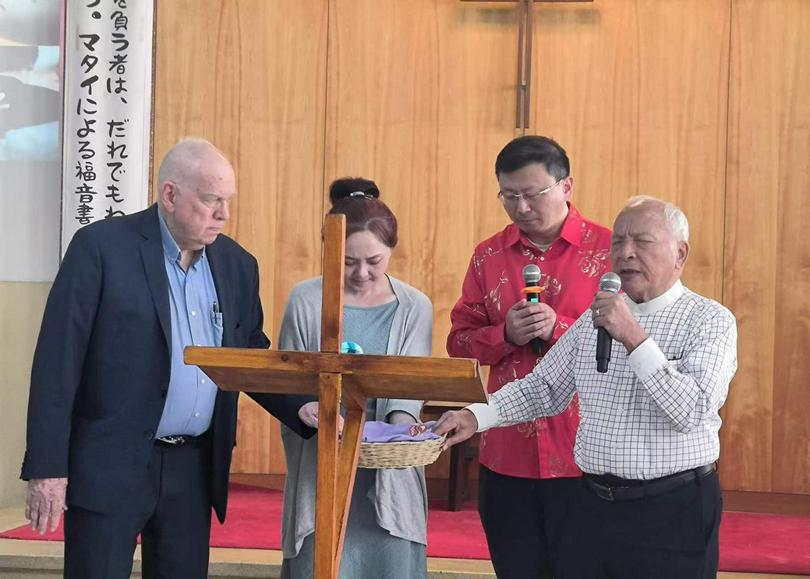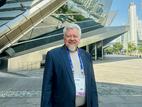From May 3 to 4, “The Revival Conference for Moses-Joshua Walking Together as Two Generations” was held in Kobe, Japan, with dozens of Chinese pastors, missionaries, and lay leaders participating in the event.
With the slogan "Holy Love Can Do!" the conference was organized by the Chinese Oneness International, aiming to help Chinese people worldwide unite in love and assist nations in fulfilling their destiny.
As the conference began, an overseas Chinese missionary first shared the history and current situation of Christianity in Japan. Japan had a long-lasting persecution of Christianity that lasted 265 years. One of the reasons why Japan has more saints canonized by the Roman Catholic Church than the Catholic country of the Philippines is that Japan’s religious persecution was extremely severe. It was only after the Meiji Restoration that the existence of Christianity in Japan became legal. After the end of World War II, General Douglas MacArthur tried to Christianize Japan, but it was unsuccessful.
Regarding the current situation, the speaker mentioned that there are approximately 180,000 religious bodies in Japan, but there are only less than 5,000 Christian religious bodies among them. Most of the Japanese religious corporations are registered as Shintoism and Buddhism. He described the life of most Japanese people as: “They are taken to shrines at birth, celebrate their weddings in churches, and are buried in a temple after death.” (The shrine refers to a Shinto building, and the temple is a Buddhist building.) There are currently about 8,000 churches in Japan, but the congregations are generally small, usually with only a dozen or so people. The average age of believers is between 60 and 80. Among Japan’s current population of about 126 million, there are over 100 million Shinto and Buddhist believers. Japanese people are afraid of gods and simply believe in all the gods they know, while the proportion of Christian believers in Japan’s total population is only 0.3% to 0.8%, the missionary added.
The Chinese speaker also analyzed why Chinese churches generally do not pay much attention to Japan. The first reason lies in the complex ethnic hatred between China and Japan. The second reason is that Chinese churches and Christians believe that Japan is developed and that Japanese churches have enough strength to develop themselves without help, so they should encounter no hardship when preaching the gospel in Japan.
Subsequently, Pastor Dennis Balcombe from Hong Kong spoke on “Pentecostal Revival and All-Powerful Evangelism.” Pastor Balcombe shared his main service experiences, including his arrival in Hong Kong from the United States and the process of establishing the Revival Church there, bringing tens of millions of Bibles into churches and Christians in mainland China, as well as his ministries in Henan, Sichuan, Heilongjiang, and other places. After that, Pastor Balcombe mainly preached the message about being filled with the Holy Spirit, emphasizing the importance of being filled with the Spirit
Rev. Donald Young, one of the leaders of the College of Prayer International in the United States and the founder of the RPG Revival Prayer Movement, gave an online speech about revival, emphasizing that revival will come to those who hunger and thirst for righteousness.
After that, Pastor Chenghan Zhuang from Taiwan shared a message about the RPG movement (Revival Prayer Group). Pastor Zhuang said that the RPG movement has two main focuses: receiving God’s presence and gaining the people who are not reached. Through RPG, people can experience God’s presence, receive God’s revelation, and enter into God’s actions. RPG is a relational prayer based on love. Therefore, two or three people in an RPG group must genuinely love each other.
Pastor Jianping Lin who is from the Atayal tribe, an indigenous people in Taiwan, first briefly introduced Taiwan’s colonial history in modern times. Taiwan was colonized by Japan for 50 years, from 1895 to 1945, but God was still working in Taiwan. In 1906, a Japanese named Inoue Yanosuke came to work for a company in Hualien but was later killed by local indigenous people. His son, Inosuke Inoue, was a Christian and studied at a Bible school in Japan. After graduating from the school, Inosuke Inoue decided to put aside his hatred for killing his father in 1908 and came to the indigenous village in Hsinchu, where he served as a medical missionary for nearly 40 years, praying constantly for the indigenous people in Taiwan. Later, Inosuke Inoue was called the “Father of Aboriginal Medical Services” and "revenge with love" by many local people in Taiwan.
The story continued with Pastor Guangsong Chen's mission back to Japan. Born in the Plum Blossom village of Hsinchu in 1930, Pastor Chen was greatly influenced by Inosuke Inoue in his youth. In 1947, Chen founded the first church of the Atayal tribe; in 1956, he graduated from a seminary and became the first pastor of the Atayal tribe. In 2013, at the age of 84, Pastor Chen still decided to go to Japan to serve as a pastor for eight years.
Pastor Shenzhu Zhou, the former senior pastor of Bread of Life Christian Church in Taipei for 34 years, talked about "unity.” He said that in Taiwan, there are many cases where two generations serve the church full-time together, but at the same time, there are many heartbreaking phenomena both in Taiwan and other places—many pastors tend to struggle with their own people and cause division. He called for unity, which is so important that Jesus prayed for the unity of his disciples even in his last moment before being crucified. He hoped that everyone could overcome all obstacles, whether it was regional prejudice, different theological ideas, or age gaps. Believers “become one” in the Lord Jesus Christ.
At the end of the conference, Pastor Balcombe and Pastor Zhou exhorted all the participants with annoiting, blessings, and prayer and then held a communion service.
- Translated by Charlie Li












